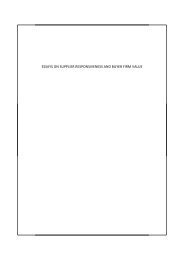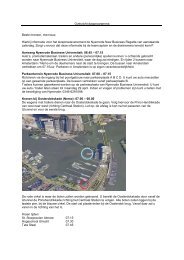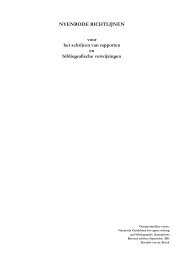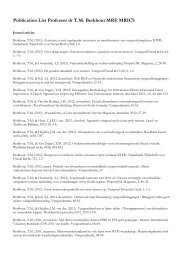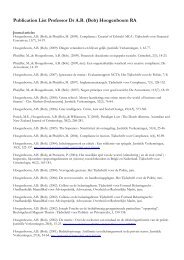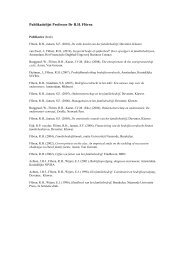pdf - Nyenrode Business Universiteit
pdf - Nyenrode Business Universiteit
pdf - Nyenrode Business Universiteit
Create successful ePaper yourself
Turn your PDF publications into a flip-book with our unique Google optimized e-Paper software.
Q14 When serving your clients, how important is the knowledge of customer specific<br />
requirements?<br />
scale: relatively unimportant, my business unit delivers standard products/services -<br />
slightly important, my business unit delivers standard products/services, with minor adaptations<br />
to customer specific requirements - somewhat important, my business unit delivers<br />
standard products/services, adapted to customer specific requirements - important, my<br />
business unit delivers tailored products/services - very important, my business unit delivers<br />
highly customer specific products/services, developed to meet specific customer needs<br />
Q15 We need to understand which ‘assets’ of your business unit (both tangible and<br />
intangible) are most critical to your business unit’s success. We would like you to<br />
indicate weights for each of these elements, so that the most important element gets<br />
most weight. Your answers should total 100 points.<br />
items: equipment (e.g., machinery, tools) - stock (e.g., materials, finished products, halffinished<br />
products) - systems (e.g., communication systems, software) - core-business employees<br />
- knowledge - brand name/image - client portfolio<br />
Information Asymmetry<br />
Q16 Please compare the amount of information you have relative to your superior (the<br />
person responsible for your performance evaluation and/or bonus determination)<br />
a. Who is in possession of better information regarding the activities undertaken in<br />
your business unit?<br />
b. Who is more familiar with the input/output relationships (the transformation<br />
process) inherent in the internal operations of your business unit?<br />
c. Who is more certain of the performance potential of your business unit?<br />
d. Who is more familiar technically with the work of your business unit?<br />
e. Who is better able to assess the potential impact on your activities of factors<br />
internal to your business unit?<br />
f. Who is better able to assess the potential impact on your activities of factors<br />
external to your business unit?<br />
g. Who has a better understanding of what your business unit has achieved?<br />
scale: your superior (1) - about equal (4) - you (7)<br />
source: Dunk (1993) (items a-d and f-g) and Kruis (item e) (2008)<br />
133




